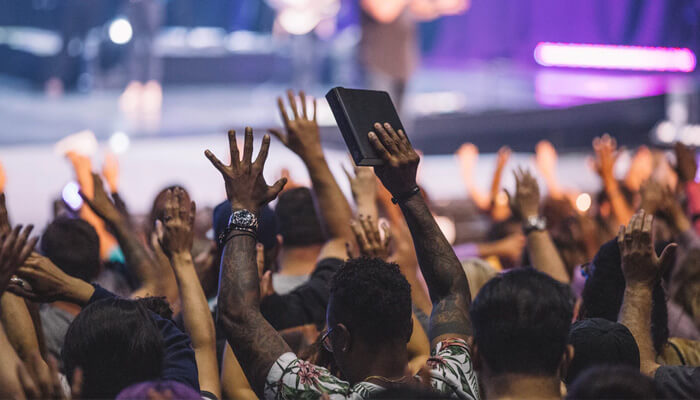A Group of Inter-Generational and Racially Diverse Evangelicals Confront Misleading Media Representation of Evangelicalism and Commit to Saving the Christian Witness
Washington, DC – Diverse evangelicals, led by people of color and women, want to bring the “good news” back to the gospel of Jesus Christ; in direct contrast to the “bad news” perpetuated by older, white, and partisan evangelical men. Evangelicals are typically identified in the media and by the public as a predominately white, politically right-wing faith group with little to no concern about the poor and oppressed.
Missing from the national conversation is a recognition that evangelicals are an ethnically diverse group. According to the PRRI 2017 American Values Atlas, thirty-five percent of evangelicals are people of color. Although the media focused on the eighty-one percent of “evangelicals” who voted for Donald Trump, it ignored the fact that seventy-two percent of evangelicals of color voted differently. This distortion undermines the Christian witness and negatively impacts American politics. Millions of people have left the faith, especially younger believers, during a time in which evangelicalism has become increasingly partisan and politicized.
The release of the “Chicago Invitation: Diverse Evangelicals Continue the Journey” signals a commitment to transform the current, false narrative around evangelicalism into a liberating one based upon Jesus’ teachings, the authority of scripture, evangelism, and God’s Biblical call to justice.
“In 1973, I participated in the process that led to the release of the Chicago Declaration of Evangelical Social Concern. The declaration came out of a multiracial and intergenerational group thatunanimously agreed upon the affirmations we included and felt the result reflected the work that God had done among and through us. That was 45 years ago. Reading it today can be heartbreaking — realizing how far in the wrong direction ‘evangelicalism’ has now gone, so diminished and distorted. In my tradition, we would call that spiritual ‘backsliding.’ 45 years later, the need to reclaim the true meaning of the word ‘evangelical’ is as urgent as it has ever been. The soul of the nation and the integrity of faith are both at stake,” said Jim Wallis, President and Founder of Sojourners.
Adam Taylor, Executive Director of Sojourners, notes the urgent need for a representative conversation around evangelicalism by stating, “It is imperative to redefine evangelicalism through the witness and lens of what has long been a much more diverse movement. The future of evangelicalism requires us to recognize that according to recent data, white evangelical churches are in decline while membership in many ethnic and diverse churches is flourishing. It is critical that the evangelical movement be defined by theological convictions and not political ones, because as Jesus points out you cannot serve two masters, in this case the gospel and a political party. By changing the public narrative to include diverse evangelicals, we can help rehabilitate the perception of evangelicals and enable our nation and the church to better cross the bridge into a more inclusive, multi-racial future that mirrors God’s kingdom come.”
“Evangelical people of color and women have been on the frontlines in the fight for dreamers (#prayfordreamers), fighting against the separation of children from their parents at the border (#notwithoutmychild), standing with folks in Charlottesville, and standing with the #metoo movement (#silenceisnotspiritual). We are trying to follow Jesus’ teaching in the Bible and to take seriously Jesus’ invitation to stand with those are the margins of society, to care about those who are being dehumanized because of their race, their gender, or their immigration status. Organizations like Christian Community Development Association and their work with dreamers, and fellow diverse evangelicals who advocate for refugees help me to understand God’s heart for the poor and the invisible people in our society. This statement re-affirms these commitments and helps connect the dots to the most pressing issues in society today,” said Nikki Toyama-Szeto, Executive Director, Evangelicals for Social Action/The Sider Center.
Available for Interviews: Jim Wallis, Adam Taylor, Nikki Toyama-Szeto, and Rev. Dr. Soong-Chan Rah
###
2018 The Chicago Invitation: Diverse Evangelicals Continue the Journey
In 1973, a broad group of evangelical leaders released the Chicago Declaration of Evangelical Social Concern, calling for a greater commitment to biblical justice that was missing in American evangelicalism. Forty-five years later, a diverse group of especially younger followers of Jesus, who emerged from and remain within the evangelical tradition, met in Chicago to continue to take up this biblical mandate. We reflected on and affirmed the 1973 statement which, in its time, was groundbreaking for addressing and combating materialism, militarism, systemic racism, and sexism—and which inspired future generations. We also discerned together how to respond to the current crises in evangelicalism, which jeopardizes the reputation and witness of the Christian church.
Sadly, in 2018, several false narratives around the identity of evangelicals in the United States undermine Christian witness and distort American politics. Often, evangelicals are identified in the media and by the public as being predominantly white, right wing, and unconcerned about the poor and oppressed. For example, the story that became nationally and globally dominant after the 2016 election was that 81 percent of “evangelicals” voted for Donald Trump,1 when, in fact, this group only represented the votes of white evangelicals. When evangelicals of color and younger evangelicals are accurately accounted for, the picture changes significantly. For example, evangelicals of color voted overwhelmingly otherwise.2
In contrast to these false narratives, evangelicals compose an ethnically diverse group whose movement reflects a historical and ongoing commitment to Jesus, the authority of scripture, evangelism, and God’s biblical call to justice.
As diverse evangelicals, our faith moves us to confess and lament that we have often fallen short of the biblical values and commitments proclaimed in the gospel and affirmed in the 1973 Declaration. In addition to the 1973 Declaration, many diverse evangelicals, including women, African-American, Latino, Asian-Pacific Islander, and Indigenous leaders, have put out strong statements that have often been ignored. Millions of people, especially younger believers, have left the faith during a time in which evangelicalism has become increasingly partisan and politicized. People on both sides of the political aisle have demonized those who disagree with us and failed to love both our neighbors and our “enemies,” as Jesus instructs us to do. We should not be captive to any political party, because our allegiance belongs to Christ. Like Rev. Dr. Martin Luther King Jr., we believe the church is “called to be the conscience of the state, not the master or the servant of the state.”
Affirming the 1973 Declaration, as well as other historic statements from diverse evangelicals, we recommit to an evangelical faith that follows Jesus’ example of living and sharing a gospel that always proclaims good news to the poor and freedom for the oppressed. (Luke 4: 18-19)
We recommit to a biblical justice that demonstrates the reign of God as we strive for abundant life for all God’s children, which must include combating economic inequality and exploitation.
We recommit to more faithfully and courageously follow Jesus, who affirmed the sacredness and dignity of all human life.
Building on the 1973 Declaration as well as other historic statements from diverse evangelicals, we also commit to love and protect all people—including life at every stage, people of color, women, Indigenous people, immigrants and refugees, LGBTQ people, people who are living with disabilities or mental health issues, poor and impoverished people, and each one who is marginalized, hungry, thirsty, naked, a stranger, sick, or imprisoned. (Matthew 25:31-46)
We commit to care for and protect the earth as God’s creation.
We commit to resisting all manifestations of racism, white nationalism, and any forms of bigotry—all of which are sins against God.
We commit to resisting patriarchy, toxic masculinity, and any form of sexism and to always affirm the dignity, voices, and leadership of women.
We commit to defend the dignity and rights of all people, particularly as we celebrate and embrace the increasing racial and ethnic diversity in our nation and churches.
We hope and pray that this statement, and the positive actions it inspires, will help to counteract and transform false narratives and stories into liberating ones. We invite you to join us in the journey of following Jesus, who calls us to proclaim and live the gospel, committed to love and justice









